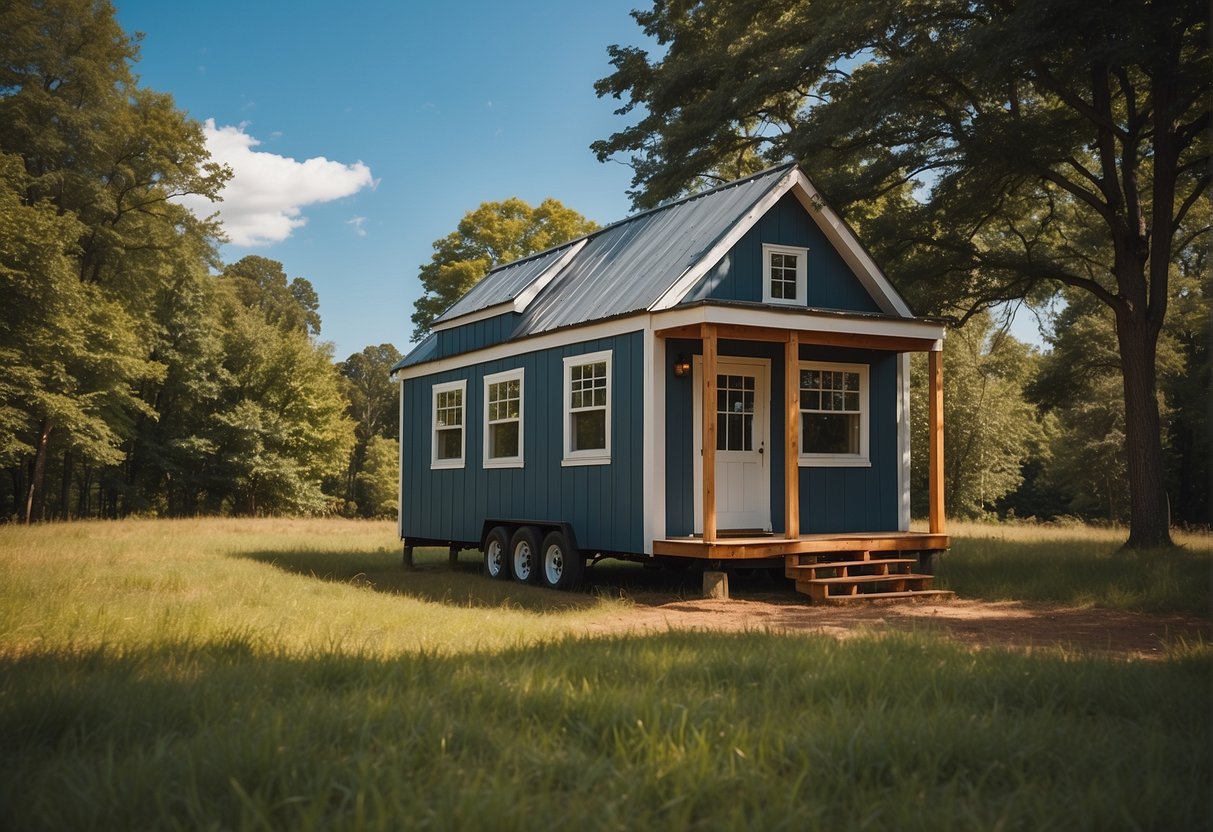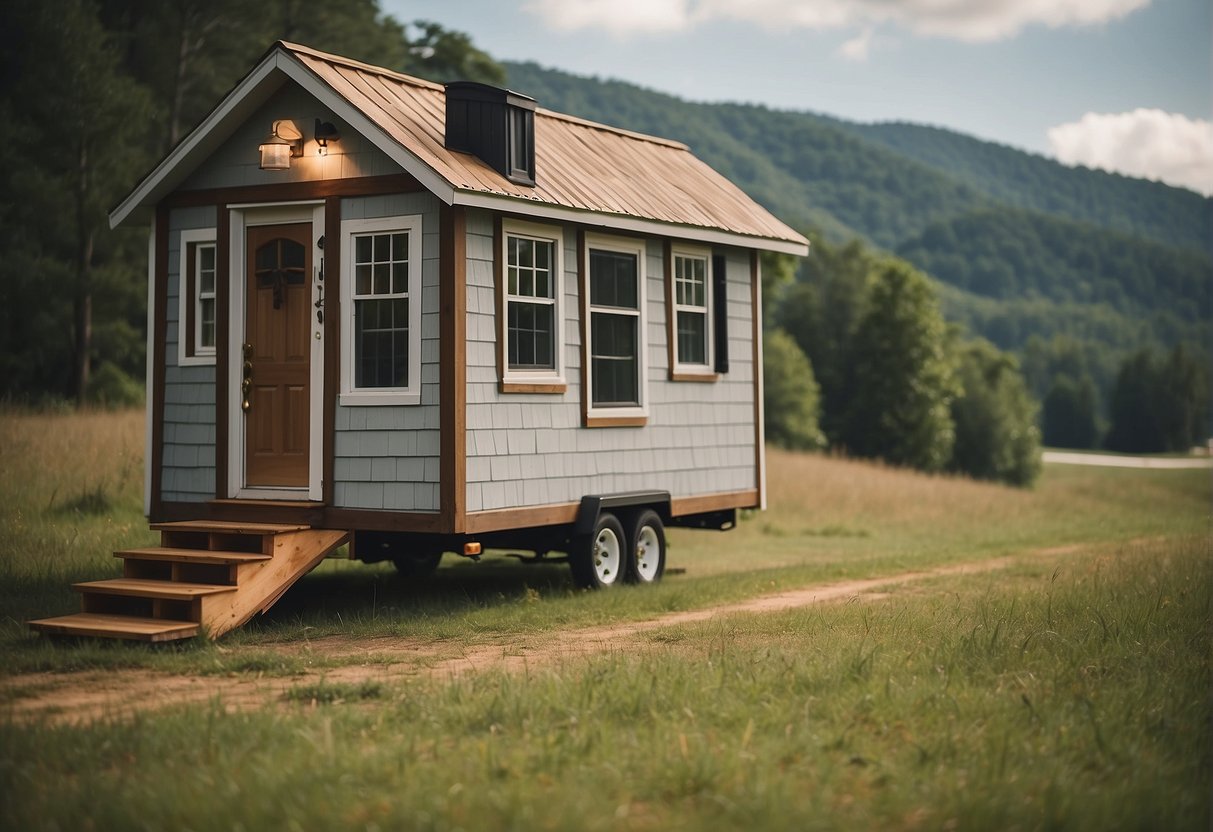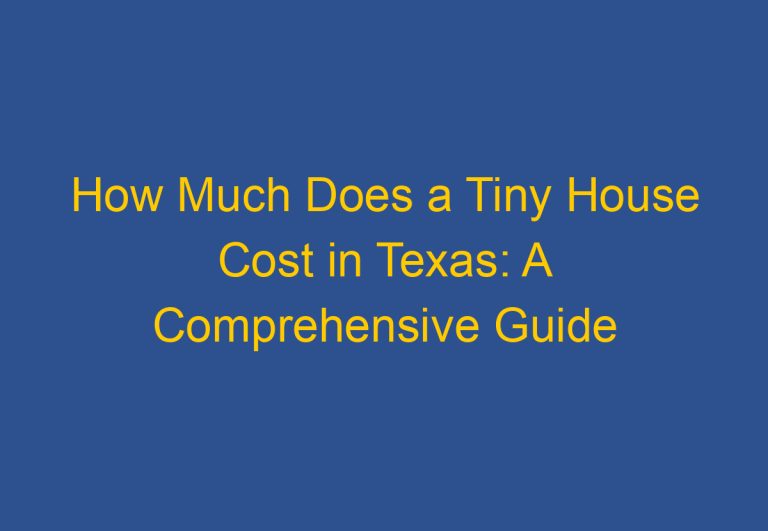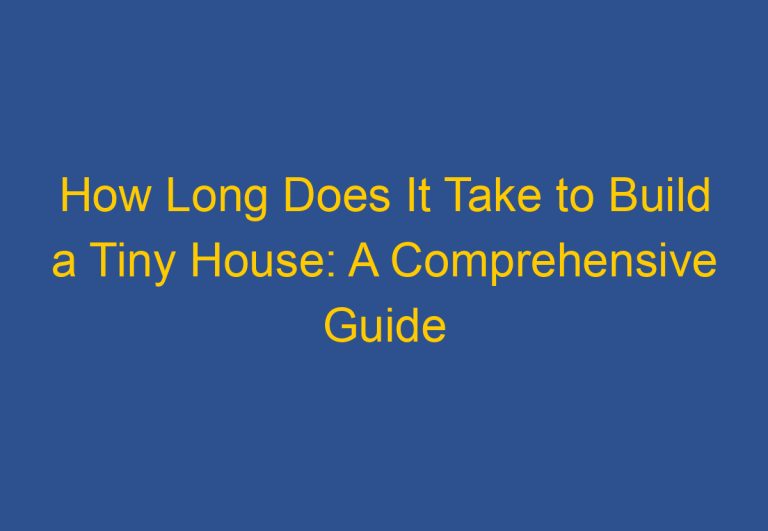Are Tiny Houses Allowed in Georgia? A Comprehensive Guide to Georgia’s Tiny House Regulations
Tiny houses have become increasingly popular in recent years, as people seek a simpler and more sustainable lifestyle. However, many people wonder whether tiny houses are allowed in Georgia, and what rules and regulations they must follow if they are. The answer is that tiny houses are allowed in Georgia, but there are certain requirements that must be met.

According to the International Residential Code (IRC), tiny homes in Georgia must meet certain standards for safety and habitability. This means that they must be up to code and licensed as a dwelling unit. Additionally, there are minimum square footage requirements and other building regulations that must be followed. However, there are few rules and regulations regarding tiny houses in the state of Georgia, which means that they are generally more flexible than traditional homes.
While tiny houses are permitted in Georgia, it is important to note that not all locations are suitable for them. Only a few counties in Georgia permit tiny houses, either as permanent residences or as auxiliary units. Homeowners must also cater to certain tiny home regulations to comply with Georgia’s building codes, such as minimum ceiling height and square footage requirements.
Understanding Tiny House Regulations in Georgia

If you’re considering living in a tiny house in Georgia, it’s important to understand the regulations that govern these unique housing options. Tiny homes are defined as single-family homes that are generally 400 square feet or less, excluding lofts. Georgia has specific laws for tiny homes that include zoning and building regulations, minimum square footage requirements, and other related laws.
Zoning Laws and Building Codes
Tiny houses in Georgia must be up to code with the International Residential Code (IRC). This means that your home must meet certain standards for safety and habitability. Additionally, your home must be insured and licensed as a dwelling unit. There are few rules and regulations regarding tiny houses in the state of Georgia. However, it’s important to note that local governments may have their own zoning ordinances that could impact the construction and placement of tiny houses in certain areas.
Permitting Process for Tiny Houses
The permitting process for tiny houses in Georgia varies depending on the location and size of the home. In general, you will require a construction permit to build a tiny house in most Georgia counties. The Banks County Zoning Department is responsible for issuing the permission in Banks County. It’s important to note that the permitting process may differ depending on local zoning ordinances and regulations.
Location and Sizing Requirements
Tiny homes in Georgia are considered to be structures that are less than 400 square feet and are built on a trailer or foundation. Georgia has minimum size requirements for homes that are built on a permanent foundation, which must be at least 950 square feet. However, homes that are built on a trailer are not subject to these minimum size requirements. Additionally, tiny homes must be located on a property that has access to utilities, including water, sewer, and electricity.
Overall, Georgia has specific laws and regulations for tiny homes that must be followed. It’s important to understand the legal requirements and permitting process before building or living in a tiny house in Georgia. Local zoning ordinances and regulations may also impact the construction and placement of tiny houses in certain areas.
Living in a Tiny House Community

Living in a tiny house community can be a great way to downsize and simplify your life. There are many advantages to living in a tiny house community, including affordability, community support, and access to amenities.
Advantages of Tiny House Communities
One of the main advantages of tiny house communities is affordability. Tiny homes are typically much less expensive than traditional homes, and living in a tiny house community can be even more affordable. In many cases, tiny house communities are located in areas with lower property taxes, making them an attractive option for those looking for affordable housing.
Another advantage of living in a tiny house community is the sense of community and support. Tiny house communities often have a strong sense of community, with residents supporting each other and sharing resources. This can be especially valuable for those who are downsizing or transitioning to a more minimalist lifestyle.
Finally, living in a tiny house community can provide access to amenities that might not be available in other housing options. Many tiny house communities offer amenities like community gardens, shared workspaces, and recreational facilities. These amenities can make living in a tiny house community a more enjoyable and fulfilling experience.
Finding Tiny House-Friendly Locations
When looking for a location to park a tiny house, it is important to research local laws and regulations. Some areas, like Atlanta and Savannah, have more lenient regulations regarding tiny houses, while others, like Macon and Columbus, have stricter rules.
In some cases, RV parks or tiny house communities may be the best option for those looking to live in a tiny house. These communities often have established relationships with local zoning departments and can provide guidance and support for those looking to park a tiny house.
When looking for a location to park a tiny house, it is important to consider factors like access to utilities, proximity to amenities, and the availability of affordable housing options. By doing your research and exploring different options, you can find the perfect location to park your tiny house and enjoy all the benefits of this unique housing option.
Frequently Asked Questions

What are the zoning regulations for tiny houses in Georgia?
Zoning regulations for tiny houses in Georgia vary by county. Some counties, such as Fulton, DeKalb, Barrow, Gwinnett, and Cherokee, allow tiny houses. However, each county may have its own set of regulations and restrictions on the size, location, and use of the tiny house. It is important to research the specific regulations in the county where you plan to build or park your tiny house.
Is there a minimum square footage requirement for homes in Georgia?
Yes, there is a minimum square footage requirement for homes in Georgia. According to Georgia laws for tiny homes, a tiny home is considered to be a structure that is less than 400 square feet and is built on a trailer or foundation. However, some counties may have their own minimum square footage requirements for homes.
What permits are needed to build a tiny house in Georgia?
To build a tiny house in Georgia, you will need to obtain the necessary permits from your county’s building department. The type of permits required will depend on the specific regulations in your county. It is important to research the specific permits required in your county before beginning construction.
Are there designated tiny house communities within Georgia?
Yes, there are designated tiny house communities within Georgia. These communities are designed specifically for tiny homes and often include shared amenities such as community gardens and gathering spaces. However, they may have their own regulations and restrictions on the size and type of tiny homes allowed.
What are the legal implications of parking a tiny house on private property in Georgia?
Parking a tiny house on private property in Georgia is legal as long as it meets the county’s regulations for accessory dwelling units. It is important to research the specific regulations in your county before parking your tiny house on private property.
How does the cost of a tiny home in Georgia compare to traditional housing?
The cost of a tiny home in Georgia varies depending on the size, materials used, and location. However, in general, tiny homes are less expensive than traditional housing. The cost of a tiny home can range from $20,000 to $100,000, while the cost of a traditional home in Georgia can range from $150,000 to over $1 million.






